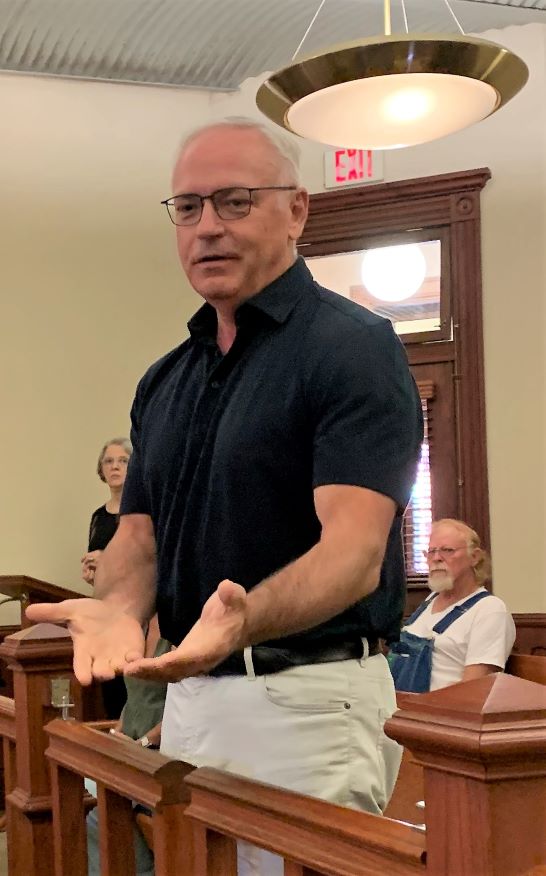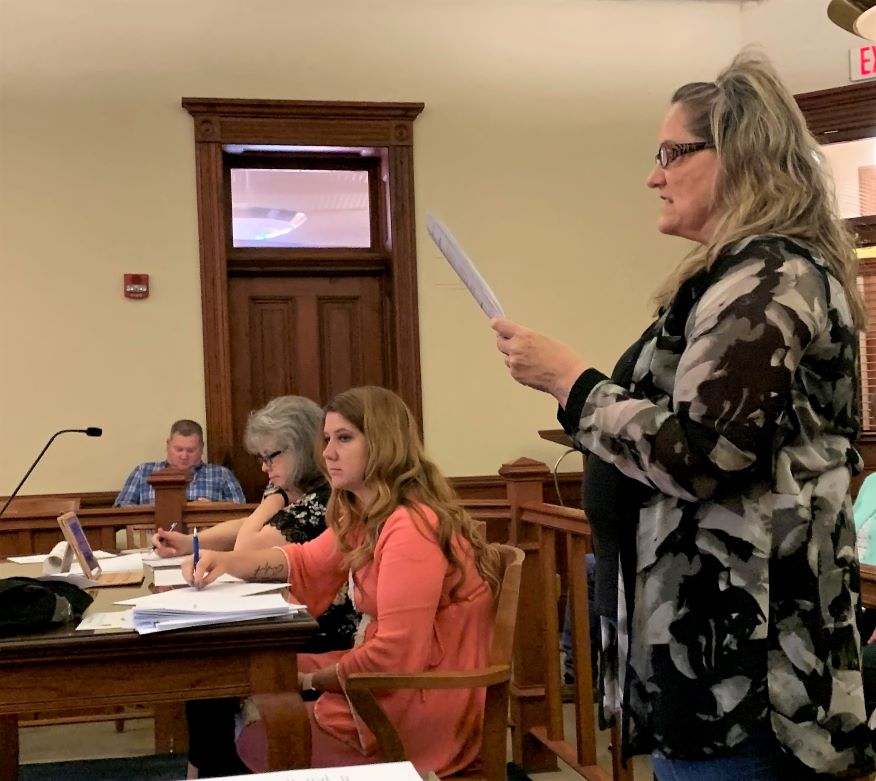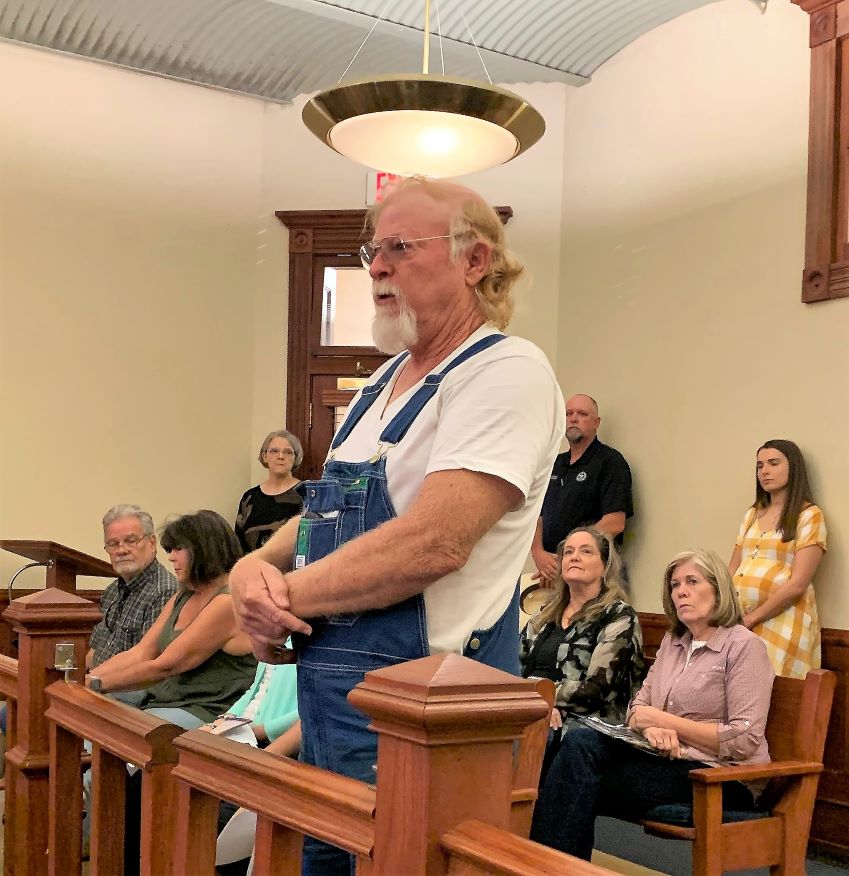Hopkins County Commissioners Court Monday morning approved a resolution granting Pine Forest Solar I LLC, and Pine Forest Hybrid I, LLC, permission to use 9 county roads during development and for improvements to the solar project planned in the area. Two Dike residents also spoke to the Commissioners Court Aug. 23, 2021, regarding the planned solar project in their neighborhood.
Pine Forest Roads
The Commissioners Court on July 26 tabled a resolution asking that the Pine Forest solar projects to be allowed to use county roads during construction and for improvements because the request did not have the specific roads that would be used. After removing it from the “table,” the Commissioners Court proceeded to officially consider the request

The developers for the project are considering considering expanding operations to add batteries, which would increase the investment up to a total potential of $252 million, explained County Judge Robert Newsom and Shannon McCall, President of Telios, the corporation overseeing the Pine Forest solar project.
“With the winter storm, the market is now increasing interest in storage. So, now we’ve added in the late spring, early summer the idea of a storage, which is an additional $150 million to the project. The investment is just wanting to ask the community, that you guys have given us the rights to use the road to build the solar. They just wanted to put in documents that we also are allowed rights use to install the storage as well,” said McCall.
That would increase the project’s overall total potential value to $252 million, McCall reported. His company last week emailed the Commissioners Court a proposal which included specific county roads the trucks hauling in equipment for construction and later improvements as needed for the solar power and energy storage project and improvements. This would give “access to, egress from, encroachments into, crossing of, and possibly upgrades to County roads, County owned rights-of-way, and County-held right-of-way easements” for the project.
The resolution gives PFSI and PFH1 and its successors and assigns, during the planning and construction phases of its Solar Power and Energy Storage Project and Improvements until the projects and improvements are completely abandoned, to use the county roads to: “(a) access and egress to and from the Solar Power and Energy Storage Project, (b) encroachment of the Solar Power and Energy Storage Project and Improvements into the right-of-way of said County roads, and (c) for overhead and underground crossings of said County roads with the Solar Power and Energy Storage Project and Improvements and with transmission lines connecting the Solar Power and Energy Storage Project and Improvements to the electrical grid power system.”
Roads to be used include Hopkins County Roads 2346, 2310, 2336, 2333, 3340, 3344, 3351, 3334 and 3342.
Citizens Comments
Two Dike residents addressed the Commissioners Court regarding the planned Dike solar project, during the citizens comments portion of the Aug. 23 meeting.
While the final design for Hopkins Energy LLC is not yet complete, Engie North America PR Kevin Phelan stated in an email to KSST earlier this month, the Dike solar project is expected to “include around 650,000 solar panels” and fewer than 100 acres out of the 1850 acres leased for the project are expected to require clearing,
Michele Barnes said during a March town hall meeting, Engie showed solar panels in a field of vegetation to attract butterflies. That, she said is misleading, because the Engie’s brochure distributed to Dike residents stated that only 10 percent of the project would have pollinator-friendly vegetation.

“That’s 185 acres. So what happens to the other nearly 17-hundred acres? Well, each land owner that was approached by Engie received an electrical packet that explains what they do with the undergrowth under the panels. They use Roundup®. So, 1,700 acres would have Roundup® applied to the ground to obstruct the leaves and natural plant life from growing around the panels to keep them growing and maintained. Where does that Roundup® go? Into the ground, affecting our underground water and due to hilly area of Dike, there will be nothing from stopping the Roundup® from flowing down south into our neighbor’s property, killing trees, vegetation and affecting the waterways which includes ponds that livestock drink from and creeks that will carry it further down south, affecting others outside the Dike area.
“The Roundup® you’re talking about going on there and running down stream, I use quite a bit around my house. Where I spray is where it kills it. It doesn’t kill everything. Mario, is that correct?” Precinct 4 Commissioner Joe Price said, seeking affirmation from Extension Agent Mario Villarino, who specializes in natural resources and agriculture.
“The life of the product is a maximum of 7 days,” Villarino said.
“So, if you spray it, and then it rains, and there’s no vegetation, will it run off into other areas?” Barnes asked.
“No, it immobilizes. It doesn’t transfer,” Villarino said.
“Well, I would like to see the data on that then,” Barnes rejoined.
Barnes also during her comments to the Commissioners Court said she’d heard Engie was trying to “woo” Precinct 3 Commissioner Wade Bartley’s neighbor into allowing Engie build near his property for the solar project.
“If you truly believe these solar panels will not do any harm,” Barnes said. “I expect to see you live out the rest of your life right next to them and be safe.”
“I am all for solar, but in the right area,” Barnes said. “Hilly, rural communities is definitely the wrong place. Dike will continue to fight this forward until it’s dying breath because we want to save our rural heritage.”
She said she keeps presenting research and data that she’s found to the Commissioners Court frequently during their meetings to do with as they choose. She noted that Dike residents’ protest of the solar farm to be constructed in their community has garnered some national attention. The community has also established a nonprofit organization and created a website to “to inform other rural communities like ours what could happen to them and they can stop the impact before it starts. They can learn from our mistake of not being involved with our local government or get information for what their local government may be hiding.”
Bartley asked Barnes if she also shares the information she presents to the commissioners court with the the two school districts and hospital district which “did exactly the same thing we did in allowing abatements for that solar company.” He queried why she keeps picking on the commissioners court.
“We’re not picking on Commissioners Court. You have a stronger rule than the schools and the hospital district,” Barnes said.
Bartley pointed out that the school districts and hospital district have control over their own taxes and allowing abatements, not the Commissioners Court.

Barnes said she’s not talking about taxes. Agreeing to zone the Dike area as industrial will increase their property values, and that in turn increases their tax bills. Bartley, however, said the county has no control over appraisals, those he said are set by the appraisal district. Barnes further contends that if the county hadn’t agreed to allow the solar farm to be built, the area where their homes are located would not have been rezoned industrial. In that way, she said, she believes the court does have a say in appraisals.
“The only reason I come up here is because if the school board and hospital district were just as interested, they’d be up here meeting also. They are more like subsidiaries of what you guys do. That’s the way I feel,” Barnes concluded.
Glenn Hamlin, a County Road 3518 resident, said while Dike resident have been told there is no flooding in the area where Hopkins Energy LLC is planned, that’s not the case.
“I’ve lived on that road ever since I was in fourth grade. I’ve lived there enough years to know what floods and to know that there is too much flooding in that area for an industrial solar plant,” Hamlin said.





